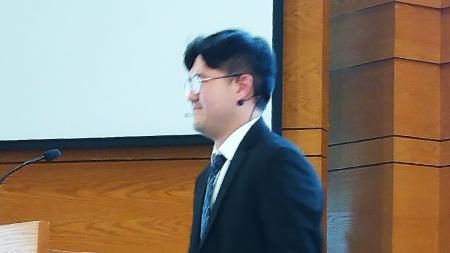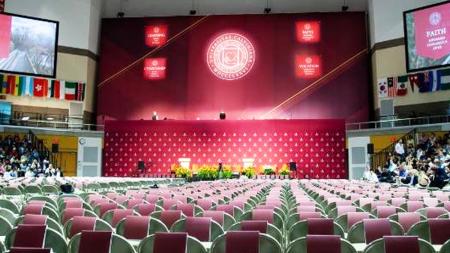Calvin College President Discusses Future

Calvin College is not alone as it faces an era of ongoing economic uncertainty and a steady decline in the number of college-age students, said Michael Le Roy, the school’s president at a January Series 2014 presentation this week.
Both private and public universities and colleges in the U.S. continue to struggle keeping costs down while at the same time making the necessary investments to attract this dwindling number of potential students, said Le Roy.
"Higher education is an anomaly. We have to offer more in order to compete and that costs more," he said. "Competition breeds higher costs."
In addition, he said, there is a concern in society today of whether higher education is worthwhile. Some people ask if, in an increasingly technological and specialized marketplace, there are enough jobs for those who have college degrees, especially liberal arts degrees.
"I don't for a moment question the value of higher education, but the culture does," he said.
"We have to continue making our case about the long-term benefits of college as something that will give a significant return in all areas of life."
The January Series 2014 is being held at the Covenant Fine Arts Center on the campus of Calvin College. People can listen to live audio presentations that start at 12:30 p.m. on their laptops and computers. Also, people at 44 remote sites can watch and listen to the speakers.
LeRoy began his talk by mentioning that higher education has faced challenges of one kind or another since the first universities began several centuries ago.
But at the same time, he said, he didn't want to downplay the difficulties that higher education is encountering today.
For instance, the number of college-age students peaked in 2009 and the trend shows no signs of reversing itself.
Meanwhile, government funding of higher education has been cut back and, statistics show, that the income of families has decreased in the last 10 years, making it harder and harder for them to pay the cost of college for their children.
"We have to ask if the government will continue to help and support higher education for families? Or will the government be involved at all? In talking to legislators, I sense indifference to this issue."
Crucial to the ongoing vitality of higher education, he said, will be to review and continue to develop sustainable business models that focus on providing quality education with adequate resources in an affordable manner.
"I see that the higher education system has been adapting to these realities and adopting best practices to improve efficiencies," he said.
Although the overall cost of education has gone up from about $17,000 a year to $30,000 over the last decade, that does not mean that the net price, when inflation and other factors are considered, has gone up significantly, said Le Roy.
Looking to the future, he said that colleges will need to continue focusing on traditional students in their early 20s, but at the same time make college available to older students who are seeking higher education in increasing numbers.
Already, the latest technologies, such as online education, have been incorporated into college curricula. And more technology will no doubt be coming down the road, said Le Roy.
But he does not see technology revolutionizing higher education. Rather, he said, he sees an evolution in how technology will be used, since the face-to-face interaction between students and faculty will remain paramount.
LeRoy also sees a renaissance in those seeking to earn a degree in the liberal arts. “I see it starting to come back,” he said.
Because of an ever-changing employment picture, it is difficult for people to prepare for a particular career. But studying the liberal arts can help students expand their minds and develop their ability to think and adapt to jobs that may not even be imagined or invented today.
"Studying the liberal arts can help you to apply your education in deep and meaningful ways," he said.
Specifically at Calvin, the school will be reaching out to enroll and help support more minority students and bolstering the ways in which students can obtain scholarships. Also, he said, it will continue to effectively provide and incorporate course offerings and remain committed to expressing the Reformed perspective.
"We believe in human freedom and depravity at the same time. We see the need to teach our students about the balance between self interest and the common good,” said Le Roy.
"We believe that we are set free by Jesus Christ and that (by teaching such biblical principles as self-control, love and patience) it is important to help form character in order for society to remain vital."


